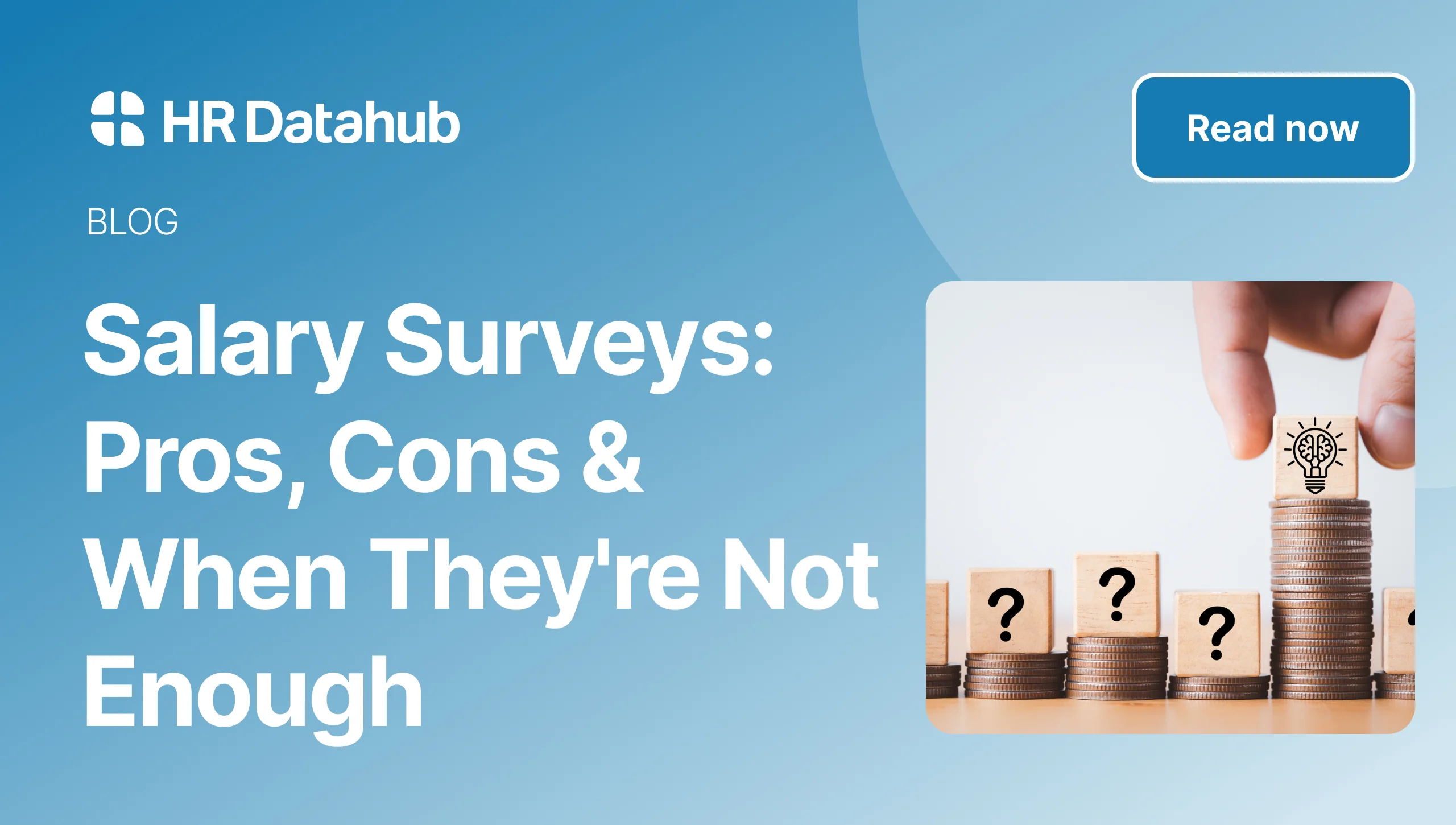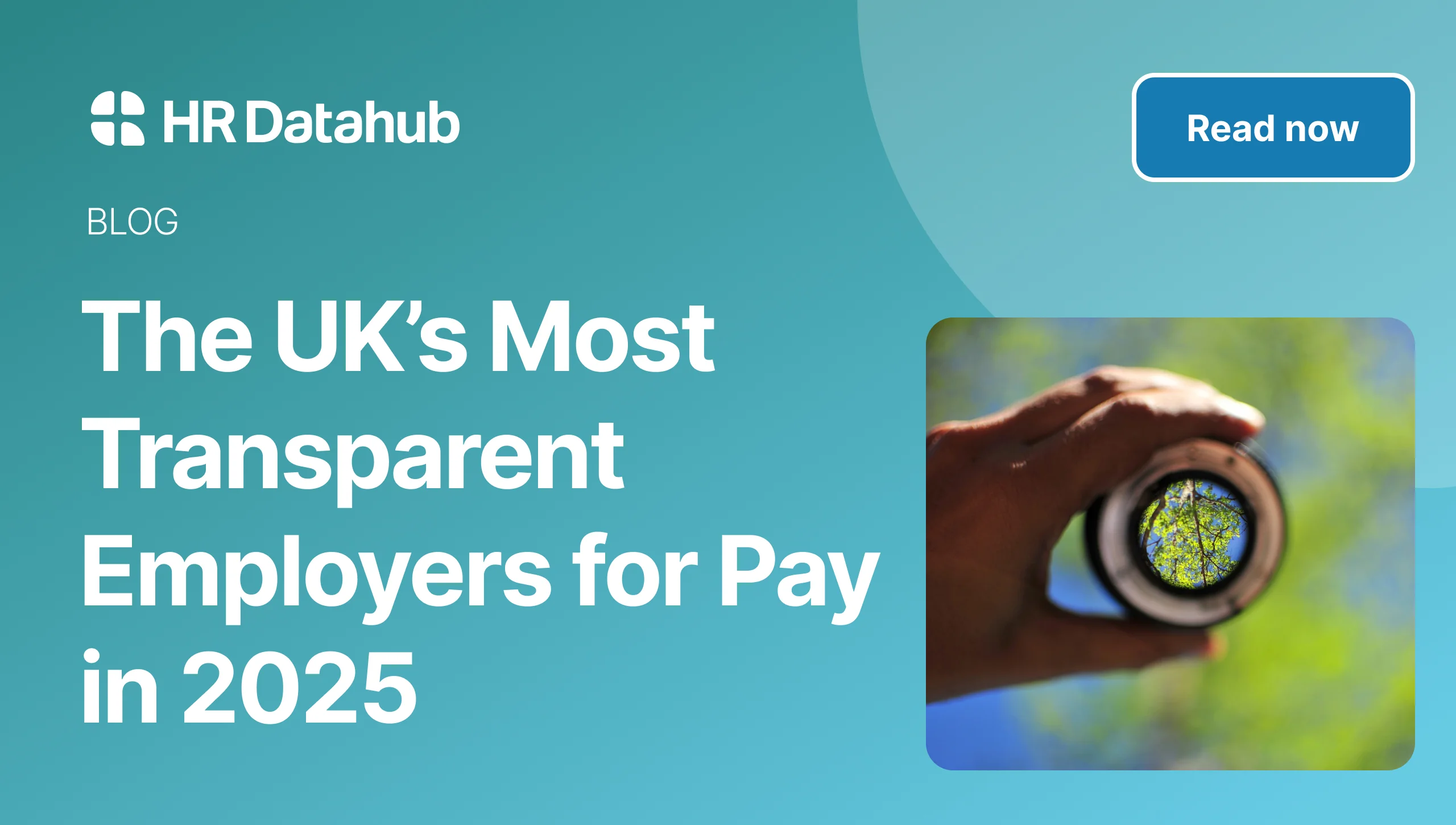

May 14, 2025
May 14, 2025
Salary Surveys Have Their Place – But Are They Still Enough?

Published by:
David Whitfield
,
CEO & Co-Founder
,
HR DataHub

Reviewed by:
Alexa Grellet
,
COO & Co-Founder
,
HR DataHub

7
MIN READ time

I’ve worked with salary surveys for years. And for a long time, they were the go-to source for making pay decisions. If you wanted to know whether you were paying fairly or whether you were at risk of losing talent, you'd turn to one of the big survey providers, run your comparisons, trust the data and move on.
But the market’s changed and fast.
Pay is shifting in real time. AI, inflation, and legislation are reshaping what people earn. And in many cases, salary surveys just can’t keep up.
That doesn’t mean they’re obsolete. They’re still useful in the right context. But if you're relying on them for every pay decision, you're probably missing the full picture.
In this guide, I’ll walk you through:
- What salary surveys are actually designed to do
- The pros and cons of using salary surveys in 2025
- Why more HR teams are looking for faster, more accurate ways to benchmark pay
What is a salary survey, and why do companies use them?
A salary survey (also known as a compensation survey) is a structured report that shows what companies are paying for specific roles. It usually covers base salary, bonus and sometimes benefits, based on salary data submitted by participating organisations.
The idea is simple: benchmark your pay against others in your industry, region or sector and use that insight to make more informed decisions.
Companies conduct salary surveys to:
- Check that they’re offering competitive pay
- Support pay reviews and reward strategies
- Build salary bands or frameworks
- Back-up business cases for hiring or retention
They’re especially popular with mid-to-large companies that want a formal, data-driven approach to pay. And when the salary survey data is fresh and the roles are well matched, they can absolutely help.
Salary surveys are often used as a foundation for benchmarking pay across job families and levels, but they’re only one part of the picture.
How much does a salary survey cost?
When it comes to traditional salary surveys run by consultancies, the price tag is hefty.
A salary survey covering specific roles, regions or benefits, costs can quickly escalate into the tens of thousands.
Pricing depends on factors like the complexity of your request, the number of roles involved, and the depth of analysis required. Some providers also charge extra for granular data cuts, executive summaries or additional consultancy advice.
It’s also worth noting that survey participation doesn’t always guarantee full access to results – many consultancies use tiered pricing, with deeper insights locked behind premium packages.
For HR teams under pressure to move quickly or control budgets, this level of spend, often with limited visibility into what you’re actually getting, can be hard to justify.
How the traditional salary survey process works
Most salary surveys follow a familiar process.
Once you’ve signed up, the provider usually sends over a spreadsheet template. Your job is to populate it with detailed employee data and then map every role to their framework. That means:
- Assigning a seniority level (often called “levelling”) – for example, Level 16 might be Director, Level 6 could be a frontline role.
- Matching roles to job families using the provider’s catalogue – so something like “HR Advisor” would sit under “HR Generalist, Level 10.”
You repeat this for each unique role in your organisation. If you're doing it for the first time, it can take days, particularly if you’re submitting to multiple providers. And even once it's done, there’s usually a review cycle where the provider sends back queries or flags mismatches, which you’ll need to adjust and resubmit.
While some companies have started to automate parts of the process, much of the work remains manual, and that can affect both time and data quality.
The pros of salary surveys
Despite their challenges, compensation surveys have stuck around for good reason. When used in the right context, they offer a level of structure and credibility that’s still valuable, especially for organisations under pressure to get pay decisions right.
Here’s where they still deliver value.
1. A structured approach to pay benchmarking
Salary surveys give you a clear framework for comparing roles across the market. Salary surveys by companies like Mercer, Willis Towers Watson and Culpepper offer standardised salary survey methods that many HR and reward teams are trained to use.
This makes it easier to create salary bands, support internal pay reviews and build consistent grading structures, which is particularly useful in larger organisations where pay transparency and governance are high on the agenda.
I've seen plenty of companies use salary surveys to formalise their reward strategy, especially during phases of scale-up or restructuring. They're often used to create job architectures from scratch or justify investment in new functions.
2. Reliable at senior and executive levels
For higher-level roles – particularly anything over £100K – salary surveys tend to be the most appropriate source of insight. The market is far less transparent at that level, and salary surveys often offer deeper coverage of executive compensation, including long-term incentives, pensions and bonus schemes.
When you're reporting to the board, citing salary data from a trusted brand often carries more weight. Surveys are still the go-to for exec pay.
3. Seen as the “standard” across many industries
For many HR and reward professionals, salary surveys are part of the toolkit they’ve used for years. They’re often the default approach, particularly in regulated sectors like finance, energy or pharmaceuticals where formal benchmarking is expected.
They also support external compliance and auditing requirements, and in some cases, they’re even baked into internal policies.
4. Deep-dive benefits benchmarking
Most salary surveys don’t include benefits data in much detail, but specialist add-ons do. If you're investing heavily in areas like pensions or LTIPs and you need deep insights beyond prevalence (e.g. actual contribution levels), some of the larger providers offer tailored reports, though at a cost.
When salary surveys fall short
Salary surveys can be useful, but they’re not without problems. And when pay decisions are being made in fast-moving, high-stakes environments, those problems start to matter a lot more.
Here are the ways salary surveys often fall short based on my own experience working with them, and why many HR teams are now looking for alternatives.
1. They’re too slow for today’s market
Traditional industry salary surveys are published months after the data is collected. It’s not unusual for providers to call for submissions in May and release results in October. That means you could be making pay decisions based on numbers that are already 6–12 months out of date.
In a market as volatile as ours, that kind of lag just doesn’t cut it anymore.
2. They rely on historical data, not what’s happening now
Market salary surveys often provide a snapshot of a moment that’s already passed. If salaries spiked during that snapshot or dipped, it can seriously skew your decisions.
Live salary benchmarking data is critical if you want to reflect what’s really happening in your industry, not just what happened last year.
With market trends shifting so quickly, using static data from months ago can leave your pay strategy exposed. Here’s what to expect from UK pay trends in 2025.
3. Role matching is inaccurate and often forced
In most surveys, you have to shoehorn each of your roles into a pre-defined catalogue. That works fine for common roles, but it falls apart for niche or emerging ones.
I’ve seen “wind turbine engineers” forced into the “mechanical engineer” category because there wasn’t a better match. You end up benchmarking against the wrong compensation data, which throws everything off.
4. Job levelling is subjective, and it skews the results
You’re expected to match each role to a specific seniority level and trust that everyone else has done the same. In reality, companies often inflate or under-report levels, which distorts the whole dataset.
If a bunch of companies submit mid-level roles as senior, the average pay jumps, and you’re benchmarking against inflated figures.
5. Generic role categories don’t reflect real responsibilities
Job titles vary massively between companies. What one business calls a “Marketing Manager,” another calls a “Head of Growth.” The grouping of roles into broad bands can flatten nuance, especially for hybrid roles or those with specialist skill sets.
6. They don’t keep up with emerging roles
When new jobs appear – AI engineers, sustainability analysts, product ops – traditional surveys struggle to catch up. Providers often need years of sample data before they’ll even add a new role to their catalogue.
And even then, it has to go through a committee. That’s not helpful when the market’s already moved on.
7. Local benchmarking is limited or non-existent
Most surveys give you UK-wide salary data, a London cut and maybe one or two regional filters. But if you’re trying to understand what’s happening in a specific town, city or warehouse hotspot, you’re out of luck.
8. They exclude many sectors and employers
Because surveys rely on voluntary submissions, you often get gaps in the salary benchmarking data. Startups, small businesses and emerging industries are underrepresented, which can seriously limit the relevance of the results.
It’s also why roles from sectors like tech, logistics, and green energy can feel “invisible” in traditional survey outputs.
9. They can reinforce inequity
Surveys are built on existing market norms. If those norms include pay gaps or historic inequality, that gets baked into the benchmarks. Most don’t account for DEI metrics or give insight into pay fairness.
That can make it harder, not easier, to close gaps in your organisation.
10. They come with hidden costs and compliance risks
Survey providers often charge extra for deeper insights or industry-specific cuts, and those costs can escalate quickly. On top of that, in regulated industries, there are growing concerns about how data sharing for salary benchmarking might breach competition law.
Some surveys are also used as a gateway to upsell expensive consultancy work, which is something I’ve seen more times than I can count.
How HR Datahub compares to traditional salary surveys
There’s still a place for salary surveys, but for most roles, most companies and most pay decisions, they’re no longer enough on their own.
As our co-founder, Alexa Grellet, put it on LinkedIn, there is no perfect dataset for salary benchmarking:

One of the biggest reasons companies switch to HR Datahub is that the salary data is live, specific and reflects what’s happening right now, not what happened six months ago.
There’s no need to submit spreadsheets or wait for reports. You can benchmark any role in seconds, filter by location, skill or competitor and get the insight you need.
And when you need to explain a pay decision to senior leaders? You can show them the data behind it, right there on screen.
Traditional surveys work in some scenarios, but if you need salary data that’s up to date, easy to explain and tailored to your market, salary benchmarking tools like HR Datahub are simply better suited.
When pay data is up to date, it’s easier to make confident, defensible decisions, especially during fast-moving review cycles. If you’re looking to integrate live market data into your own salary review process, this article explains how.
Case Study - Marston’s PLC
Live, real-time data is now the baseline expectation, particularly for roles that are in high demand or markets where pay is changing quickly. And that’s exactly where HR Datahub helped Marston’s.
Marston’s, one of the UK’s leading pub operators, needed better visibility into fast-changing pay expectations across its workforce. Relying on static salary surveys meant they often struggled to react to shifts in candidate behaviour or localised market pressures.
By switching to HR Datahub, they were able to access live, location-specific salary data and use it to shape pay decisions on the ground quickly.
The result? More responsive pay reviews, better alignment with local hiring conditions and stronger credibility with internal stakeholders.
You can read the full Marston’s case study here.
HR Datahub - A better experience for HR teams
Here’s what teams consistently tell us they value about HR Datahub:
- No spreadsheets, no integration, no delays – just log in and start benchmarking
- See what’s happening in the market right now, not six months ago
- Drill down by skill, location or employer to get truly relevant insights
- Transparent salary data you can show to stakeholders without needing a methodology explainer
One client put it best:
"Of all the years I’ve been working in HR and recruitment, I’ve never seen anything that enables you to get the information you need for benchmarking that quickly. It gives you the ability to quickly find the information that’s going to help make a better, more fair decision in regards to pay reviews." - Mark Fallon, Senior HR Business Partner
For faster, clearer and more actionable pay insights, explore HR Datahub’s features or get in touch to see how it can work for your team.
TABLE OF CONTENTS


.jpg)

